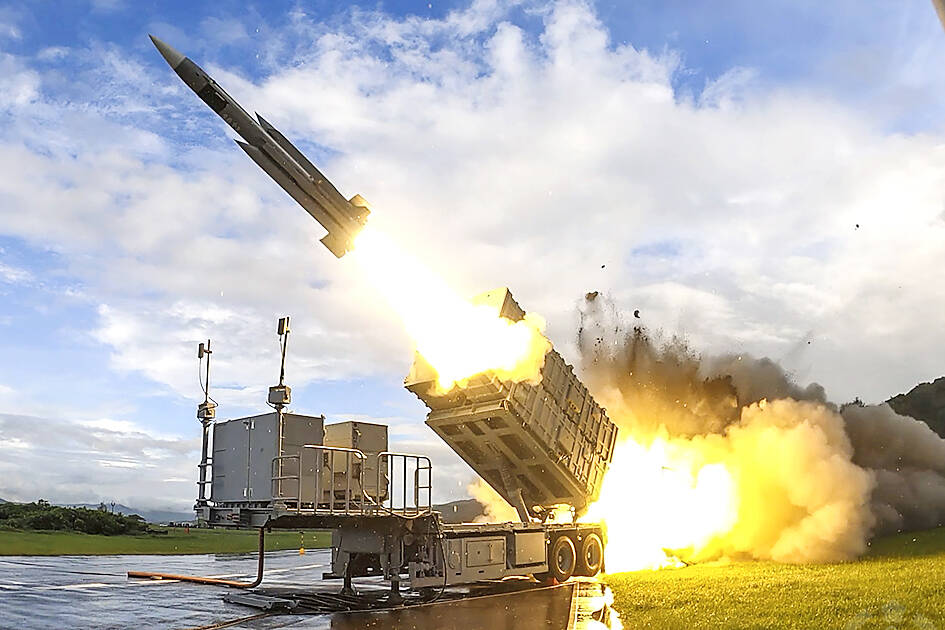The Ministry of National Defense’s Special Budget for Acquisitions under the Sea-Air Combat Power Improvement Plan is expected to significantly stimulate the domestic economy, with the ministry having allotted NT$176.27 billion (US$5.45 billion) to purchase various items from domestic suppliers, the ministry’s latest report to the Legislative Yuan showed.
The report said that missile acquisition and production comprise the majority of the budget set aside to purchase domestic supplies at NT$88.82 billion, while purchases of a variety of platforms stand at NT$31.8 billion, construction efforts are estimated at NT$38.09 billion and logistics-related acquisitions at NT$17.5 billion.
The improvement plan intends to establish coastal anti-surface batteries, which call for increased production of Hsiung Feng II (Brave Wind, 雄風) and III missiles, as well as Hsiung Sheng Missile Systems which use the Hsiung Feng IIE and extended-range Hsiung Feng IIE cruise missiles.

Photo: Ministry of National Defense via AP
The improvement plan also calls for the acquisition of highly efficient ships, the acquisition of Wan Chien (Thousand Sword, 萬劍) cluster-munition missiles, Chien Hsiang (劍翔) uncrewed aerial vehicles developed by the Chungshan Institute of Science and Technology, as well as ground-based surface-to-air missile (SAM) bases featuring Tien Kung III missiles (Sky Bow, 天弓) and their extended range variant, the report said.
It added that the project also aims to acquire more field-based SAMs and is looking into the possibility of arming the Coast Guard Administration during times of war.
Citing a previous report, the ministry said annual production rates for land-based and ship-based Tien Chien (Sky Sword, 天劍) missiles have risen from 40 to 150; the rate for Sky Bow missiles has doubled from 48 to 96. The rate for Hsiung Feng II and Hsiung Sheng missiles, which share a production line, has risen from 81 to 131, while the rate for Hsiung Feng III supersonic anti-ship missiles has risen from 20 to 70.
In terms of counteroffensive weapons, Wan Chien missiles are expected to see an annual production rate of 50, up from 18 currently, while the rate of production of the Jian Hsiang drone, which does not yet have an annual production rate, is expected to reach 48 per year, the report said.

A strong continental cold air mass is to bring pollutants to Taiwan from tomorrow, the Ministry of Environment said today, as it issued an “orange” air quality alert for most of the country. All of Taiwan except for Hualien and Taitung counties is to be under an “orange” air quality alert tomorrow, indicating air quality that is unhealthy for sensitive groups. In China, areas from Shandong to Shanghai have been enveloped in haze since Saturday, the ministry said in a news release. Yesterday, hourly concentrations of PM2.5 in these areas ranged from 65 to 160 micrograms per cubic meter (mg/m³), and pollutants were

Taiwan’s armed forces have established response protocols for a wide range of sudden contingencies, including the “Wan Chun Plan” to protect the head of state, the Ministry of Defense (MND) said today. After US President Donald Trump on Saturday launched a series of airstrikes in Venezuela and kidnapped Venezuelan President Nicolas Maduro, concerns have been raised as to whether China would launch a similar “decapitation strike” on Taiwan. The armed forces regularly coordinate with relevant agencies and practice drills to ensure preparedness for a wide range of scenarios, Vice Minister of National Defense Hsu Szu-chien (徐斯儉) told reporters before a

EVA Airways on Saturday said that it had suspended a pilot and opened an investigation after he allegedly lost his temper and punched the first officer several times as their plane was taxiing before takeoff at Los Angeles International Airport. According to a report published on Thursday by The Reporter, the incident occurred after the flight’s Malaysian first officer tried to warn the Taiwanese pilot, surnamed Wen (文), that he was taxiing faster than the speed limit of 30 knots (55.6kph). After alerting the pilot several times without response, the first officer manually applied the brakes in accordance with standard operating

NOT AN OPENING: Trump’s violation of international law does not affect China’s consideration in attacking Taiwan; Beijing lacks capability, not precedent, an official said Taiwanese officials see the US’ capture of the president of Venezuela as a powerful deterrent to Beijing’s aggression and a timely reminder of the US’ ability to defeat militaries equipped with Chinese-made weapons. The strikes that toppled Venezuelan President Nicolas Maduro signaled to authoritarian leaders, including Chinese President Xi Jinping (習近平), US President Donald Trump’s willingness to use military might for international affairs core to US interests, one senior official in Taipei’s security circle said. That reassured Taiwan, the person said. Taipei has also dismissed the idea that Trump’s apparent violation of international law could embolden Beijing, said the official, who was not